Candidates speak to CCHS class
By Chris Baldus | cbaldus@charlescitypress.com
Some of Charles City’s newest voters are seniors at Charles City High School. On Friday, county and state candidates, as well as one congressional hopeful, dropped by a social studies class to answer questions.
In the final session of the day, with two women among the candidates in front of the room, Tauna Mayhorn, 17, asked Democratic congressional Candidate Kim Weaver what it’s like as a woman to run for office. Mayhorn, who plans to study political science at Simpson College, said that she maybe someday seek office herself.
Weaver of Sheldon, Iowa, who is challenging incumbent Steve King in the 4th District, she has had maybe two moments her male counterparts likely would not experience, such as surprising a man who assumed she would be a man. A second experience involved a question.
“I was at an event and they asked me how I was able to take care of my home while I was out campaigning?” she said “And I thought, ‘Well, I have people that help me and I’m not sure I’ve ever heard a man be asked that question.’ Other than that I really haven’t had an issue.”
Charles City social studies teacher Steve McGrew invited all county, state and federal candidates that directly represent the area to attend his classes throughout Friday. They were asked to introduce themselves and then answer questions from students.
Taking up McGrew’s offer were Floyd County Supervisor Roy Schwickerath, Democrat, and his Republican challenger Linda Tjaden; Democratic incumbent state Sen. Mary Jo Wilhelm, state Rep. Todd Prichard, D-Charles City, and his Republican challenger Stacie Stokes, R-Rockford; Floyd County sheriff candidate William Vetter; and Weaver.
Mayhorn said the experience was very different than what she’s seen of the presidential races. The local candidates were “a lot more chill,” she said.
“When we watch (the presidential candidates)and talk about them at home we’re just like ‘What? Oh that’s intense,'” she said. “But (the local candidates) sitting in the classroom — it was kind of like we were all at the dinner table talking … very respectful of each other, which is a lot more than I can say for the national election.”
Weaver encouraged Mayhorn to seek office one day. School board or county offices are a good places to start, as is getting involved with a political party, she said.
Mayhorn, incidentally, is among the students being considered tonight by the Charles City School Board for the School Improvement Advisory Committee.
Seniors Drew Mitchell and Nate Lasher, both 18, plan to vote for the first time this year. Of the presidential race, Mitchell said: “It’s definitely a crazy one.”
“For president, kind of a crappy first election,” Lasher said.
“Definitely an entertaining one though,” Mitchell said. “You never know what’s going to happen between the two candidates.”
The debates had an impact on their decisions, they said.
Said McGrew: “I get the sense the kids look at the Trump and Clinton race as more entertainment in some capacities instead of serious political issues.”
Personal relationships have a larger affect in the local races.
“We know them, we know how their personality is, what they do when they are not on the job,” Mitchell said. “That can persuade your vote some.”
Third parties gave this year’s project a new wrinkle.
“(Most of the students are) fed up with the presidential level race, that’s for sure,” McGrew said. “They’ve … thought about (Gary) Johnson as a third party candidate. They talked about that kind of thing, and I never heard anyone talk about that in any classes in previous years.”
He added that there are also some stalwart supporters for each presidential candidate. “Particularly on the Trump side,” Weaver said. “There are boys in various classes that are very big Trump supporters, but there are some boys and girls that are Clinton people. I don’t see a lot of females that are Trump supporters in my government classes.”
Students seemed particularly concerned about student loans and college costs, as well as jobs and mental health, McGrew said.
“I believe that student loan debt is our next national financial crisis,” Weaver said.
She supports establishing a program through which students can get some of debt forgiven through volunteering in their communities.
“It’s not cheap to go to college and it’s really difficult to get ahead in life without some form of advanced education either community college or going to a trade school,” she said. “And by being able to work off your debt you’re going to be much more able to start a family, buy a house, buy a car even maybe just not live in your parents’ basement.”
Candidates noted Iowa water quality and education as top issues, he said. And in the day’s final session, when Mitchell asked state House candidates what they would do to for wild life, water quality came back up.
Stokes answered first by noting her personal an interest in helping wildlife because some members of her family members hunt and enjoy outdoor activities. However, she’ll be relying on numerous people more versed in issues affecting wildlife.
“What would I personally do? I might not know the answers to everything but I know I can rely on others to help me and guide me to get the right direction,” she said. “I don’t think I need to know exactly, exactly what needs to be done, because I know some experts that can help and guide me a long the way.”
Prichard followed by first saying that in the Legislature there are “six of us … we call ourselves the Sportsmen’s Caucus.” The group is bipartisan and “we’re all kind of passionate about hunting.”
He referred the students to ponds that have been dug in the last year between Floyd and Nora Springs. The ponds have signs designating them at projects of CREP — Conservation Reserve Enhancement program. It’s a partnership between landowners, state, and sometimes the federal government, that in this case is trying to solve water quality issues, not necessarily to create habitat and wetland, he said.
“The nice thing about these projects is they do all sorts of good things,” Prichard said. “They retain water from flooding, so flooding is not as severe. We saw that actually in practice about three weeks ago here in Charles City. And then they reduce the sediment and pollution in the water … Then if you go by and look at those ponds, they have a lot of water fowl in them. That makes me excited because then there’s probably good habitat for pheasants there.”
He added that water quality issues will be huge this coming Legislative session, with the biggest challenge being finding money for projects.
-20161024-

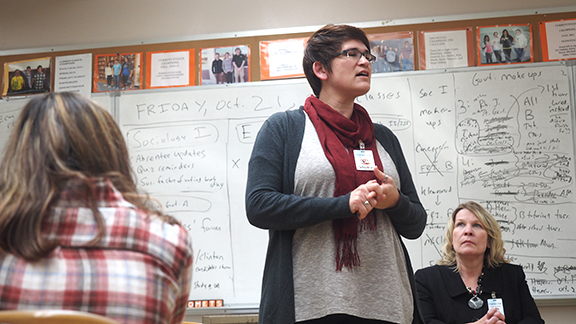
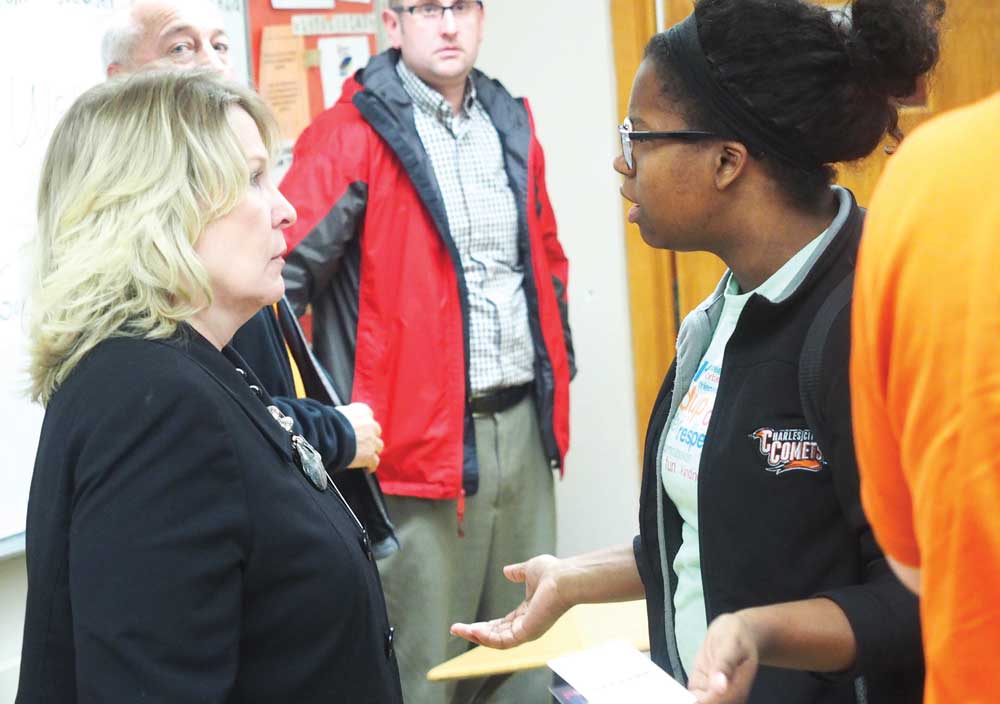
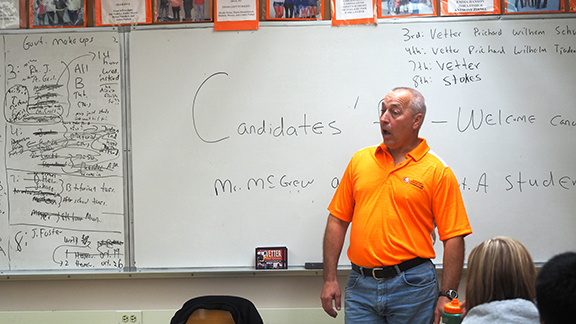
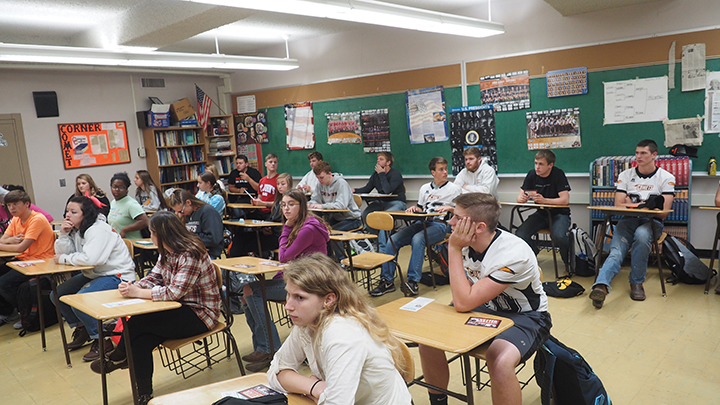
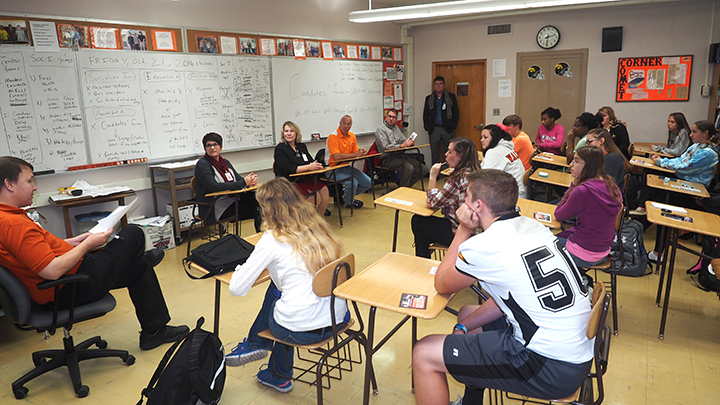
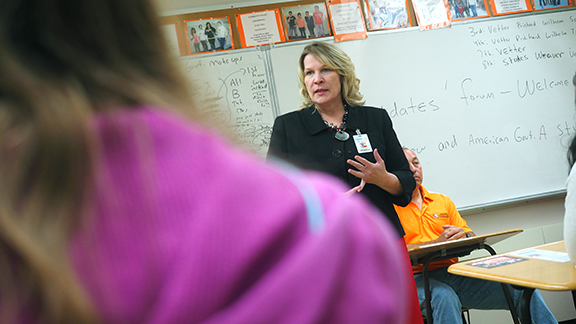
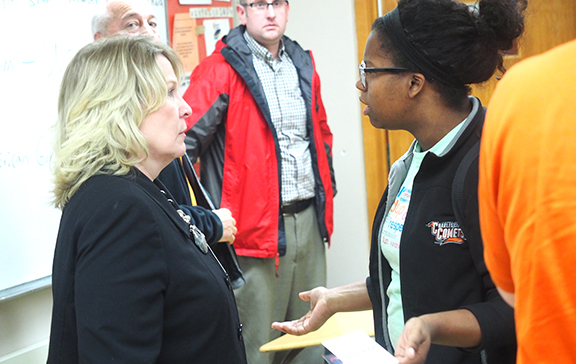








Social Share